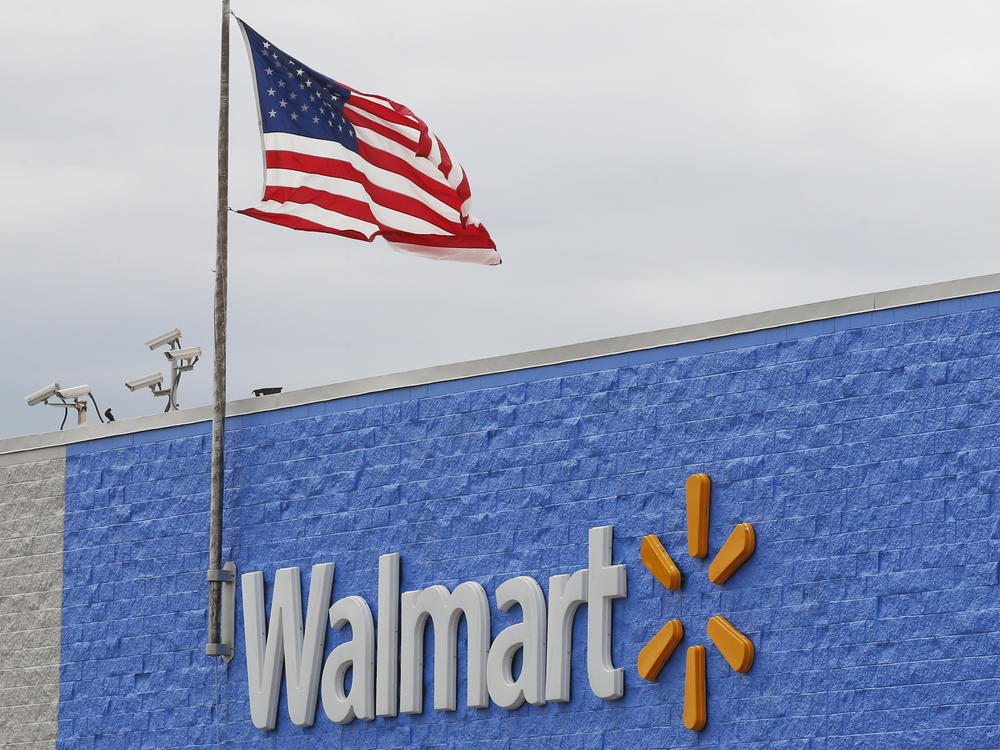Section Branding
Header Content
Walmart Is Latest Big-Name Company Embroiled In Opioid Crisis
Primary Content
One of the nation's top retailers Walmart faces growing legal and financial peril stemming from claims its pharmacy chain helped fuel America's opioid epidemic.
The Justice Department Tuesday filed a civil suit accusing the company of failing to stop "hundreds of thousands" of improper opioid transactions at its warehouses and pharmacies.
The DOJ is seeking penalties it says could run into the billions of dollars.
"Walmart had the responsibility and the means to help prevent the diversion of prescription opioids," says Jeffrey Bossert Clark, Acting Assistant Attorney General of the Civil Division, in a statement.
"Instead, for years, it did the opposite — filling thousands of invalid prescriptions at its pharmacies and failing to report suspicious orders of opioids."
Warning signs
The federal complaint details more than a dozen specific instances where Walmart pharmacists observed troubling behavior by doctors or patients but allegedly continued to fill opioid prescriptions.
Warning signs included patients traveling long distances to fill prescriptions and doctors prescribing large quantities and dosages of opioids to numerous patients.
In one case cited by the DOJ, a Georgia doctor was flagged by Walmart pharmacists as a "suspicious MD" who "always writes excessive quantities [of opioids] for his patients."
The company continued to fill that doctor's opioid prescriptions for years "despite Walmart's knowledge of red flags indicating a very high probability" they were invalid, the DOJ claims.
The DOJ complaint includes an excerpt from one internal Walmart email where an executive is alleged to have suggested the company's focus should be on "driving sales" of opioids rather than watching for red flags.
'Trying to shift blame'
Walmart denies any wrongdoing.
"It is outrageous the Department is trying to shift blame for DEA's own well-documented failures in policing the very doctors it gave permission to prescribe opioids," the company said in a statement to NPR after the DOJ suit was filed.
Walmart filed a pre-emptive countersuit in October claiming the DOJ was attempting to embarrass the corporation as part of an effort to leverage a sizable financial settlement.
In the statement to NPR, Walmart again accused federal authorities of unethical conduct.
"The Justice Department's investigation is tainted by historical ethics violations, and this lawsuit invents a legal theory that unlawfully forces pharmacists to come between patients and their doctors," Walmart says in a statement sent to NPR.
But in the October countersuit, Walmart's attorneys also acknowledged the legal risk faced by the company.
"Walmart and its pharmacists may be held liable — perhaps even criminally —for failing to second-guess DEA-registered doctors and refuse their prescriptions," the company says as part of its complaint.
Walmart faced a wave of civil claims
Even before the DOJ suit was filed Tuesday, Walmart faced a growing wave of civil claims brought by state and local governments. They've accused Walmart's chain of pharmacies of contributing to the addiction crisis, especially in rural counties.
"Walmart knew that the number of opioid prescriptions filled by its retail pharmacies was unreasonable and indicative of diversion," alleged West Virginia Attorney General Patrick Morrisey in a lawsuit his office filed in August.
"Rather than report suspicious orders and stop the diversion, Walmart continued to sell, ship and profit from these highly dangerous drugs."
Another federal lawsuit filed by two counties in Ohio against Walmart and other chain pharmacies is also moving forward after Federal Judge Dan Polster declined to dismiss the case earlier this year.
In his August ruling, Polster pointed to "obvious deficiencies" in Walmart's system for safeguarding opioid distribution that could leave the company liable.
NPR reviewed federal opioid distribution data collected by the DEA, made public last year following a lawsuit filed by the Washington Post.
It showed Walmart distributed enormous numbers of high-risk pain pills such as Oxycontin even as the addiction crisis exploded.
During one six-year period from 2006 through 2012, Walmart's warehouse and distribution network delivered more than 52 billion opioid pills to pharmacies, according to the DEA records.
The Justice Department now claims Walmart's behavior contributed to the deadly wave of opioid overdoses that claims tens of thousands of lives every year.
Too many lives lost
In one case cited in the complaint, the DOJ says a Walmart pharmacy in Pennsylvania continued to fill thousands of prescriptions for a known "pill mill" doctor who is now under indictment after five patients died.
According to the Centers for Disease Control and Prevention, roughly 450,000 Americans died during the opioid crisis between 1999 and 2018. Last year saw another record number of opioid fatalities.
"Too many lives have been lost because of oversight failures and those entrusted with responsibility turning a blind eye," says Drug Enforcement Administration Acting Administrator Timothy Shea in a statement about the DOJ's Walmart suit.
Walmart is the latest name-brand American company embroiled in the legal, financial and public relations backlash from the opioid crisis.
Cardinal Health, CVS, Johnson & Johnson, McKesson, McKinsey, Rite-Aid, Walgreens and other blue chip corporations all face lawsuits or congressional inquiries stemming from their role making, selling or dispensing opioids.
"It has been a priority of this administration to hold accountable those responsible for the prescription opioid crisis," said the DOJ's Jeffrey Bossert Clark in his statement Tuesday.
Last year, Purdue Pharma was forced into bankruptcy for its role manufacturing and marketing Oxycontin. In October of this year, the company settled civil and criminal complaints with the DOJ with penalties set at more than $8 billion.
Purdue Pharma's owners, members of the Sackler family, have tentatively offered to give up control of the company and pay out roughly $3 billion of their personal wealth.
Copyright 2020 NPR. To see more, visit https://www.npr.org.

